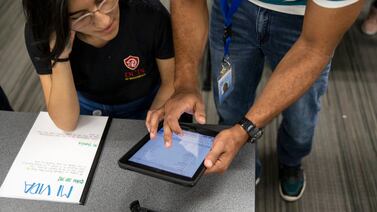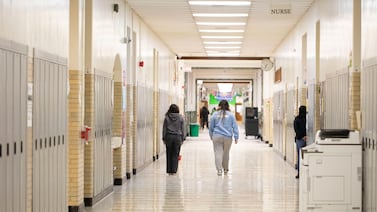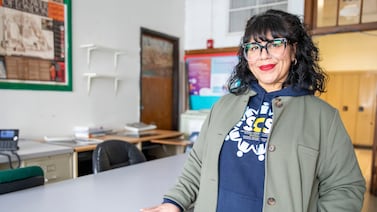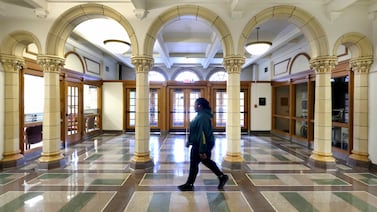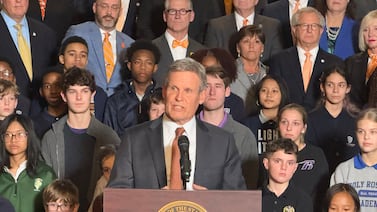Sign up for Chalkbeat Chicago’s free daily newsletter to keep up with the latest education news.
Counselor Marisa Mathews arrived at Chicago’s Prescott Elementary just as students were returning to the school after pandemic-era remote learning. That meant the former middle school English teacher had to get right to work addressing COVID’s mental health toll on students and a rise in disruptive student behaviors.
She says teamwork has been key — from tackling issues with the school’s new behavioral health and climate teams to working more closely with families. The campus has also bet big on embracing restorative practices, including a push to give students the chance to drive conversations about conflicts and school culture.
This spring, these efforts helped Mathews become the Illinois School Counselor of the Year. The sole counselor working with Prescott’s roughly 400 students, Mathews also recently earned the school a Recognized Model Program designation from the American School Counselor Association.
As a new school year ramps up, Mathews says the work of helping students with heightened social-emotional and mental health needs post-pandemic is still in full swing. But she says she is encouraged to see some improvement — and younger students who were not as intensely affected by COVID’s profound disruption.
What drew you to a career as a school counselor?
I started as a teacher as many school counselors do. When I was teaching, one of the things I noticed a lot was that students would often come up to me with something they just wanted to talk about, and it was often very important to them. But I had an entire classroom of people that I was also working with, and so I was never able to fully dedicate my attention to what that student needed. I realized over time that I would rather be doing that than being in front of the full classroom, so I started to research ways to do that.
When I grew up, we didn’t really have school counselors at the younger grade levels, and at the high school level, it was mostly just help with picking your classes. So it didn’t really occur to me that this was something that I could go into. I ended up going back to grad school to get a school counseling degree.
There has been much discussion of students’ heightened mental health needs post-pandemic and an uptick in disruptive behaviors. Chicago Public Schools has made headway in helping students recover academically, especially in reading. Are we starting to see some social-emotional and mental health recovery as well?
I was just talking to one of our kindergarten teachers today that this year does feel a little bit calmer in terms of behaviors. Students starting kindergarten this year would have been babies during the height of the pandemic. A lot of students who are now coming in did get a chance to go to preschool, which of course changes how they react when they get to school.
I do think we are still having some continuing mental health effects for students; those students who have struggled over the last few years do often continue to struggle. It has not been a quick fix. We are working with families to make sure that whatever we’re doing in school is mirrored at home, and making sure that they’re getting outside supports if what we can provide in school is not enough.
What have you found the most helpful in addressing these heightened needs during the school day?
Having a team of people is really helpful. Most schools in Chicago do not have behavior specialists in the building. We barely have enough school counselors or social workers to handle the case loads we have right now. I have almost double the recommended American School Counselors Association ratio for counselor to students in a building.
Our school and almost all schools in Chicago Public Schools have what’s called a behavioral health team. That’s where teachers, parents, and other school staff can refer students for more intensive support. At our school, that team is made up of myself, our school social worker, a restorative practices coordinator, and administrators. We also are lucky to have a school-based therapist who’s here a couple days a week. She is really great at thinking about different interventions that can be helpful for kids and getting other folks involved, like our school security officer or our clerk. It’s definitely not something that one person has all the answers or has the magic wand.
Was Prescott’s behavioral health team in place when you started at the school, or did the school launch it more recently?
The previous counselor attempted a behavioral health team. CPS now expects schools to have that, and the district provides support in launching that at your school. So my first year, it was just myself, our school social worker, and our assistant principal at the time. We realized that three people were not enough to actually do the work that we needed to do, so we have since expanded the team. A lot of the interventions are done either by me or our school social worker, but it is always great to have other thought partners trying to figure out what can help certain students.
What are other new approaches or techniques you have tried out since COVID?
My first year at Prescott, when we started to see a lot of these behaviors, I noticed the way that we handled discipline at our school. We also started a culture and climate team that same year, which is another CPS initiative. We looked at restorative practices, which is a different way of approaching discipline, but also a mindset for how you work with students. We were able to find the funding to have one of our kindergarten teachers transition into the role of a restorative practices coordinator, and it really has transformed the way we do discipline at our school.
There’s so much more accountability for the students, but it’s not punitive. They know so much more about the why behind their behavior, and then also what happens afterwards. The way that teachers talk to students, and students talk to teachers, and they build relationships, and we hold kids accountable for when they do make mistakes is absolutely having a positive impact on their social, emotional and mental health. They feel like school is a safe place for them.
What has been most effective in embracing restorative practices as a school?
Our restorative practices coordinator has continued to do a lot of professional development with teachers and staff. Every year we also train students to be restorative justice circle keepers. Because I spend more time in classrooms and doing small groups, I’m the one who does that work, which is always really fun. I get to see students take on this new and different leadership role, especially at this point when they have a lot of experience participating in circles and restorative conversations so they feel comfortable going to that next level and leading them.
There is a big push right now to start conversations about what happens after high school much earlier with students, including doing career exploration in middle school. How are you doing that work at Prescott?
In Chicago, having these conversations in middle school connects really well because students apply for high school, and there are so many high school programs that are career and technical education focused. In seventh grade, we start to look at inventorying students’ interests and skills. From there, they can start to see pathways that might be appropriate for them.
Obviously, things change. They are only 12 or 13 years old at that point, but it does allow them to think about, “Oh, I really like math and science, and I’m really good at it. Maybe I should go to a STEM program in high school.” Or, “I’ve always loved going out to eat with my family. Maybe I should consider culinary arts.” This sets them up to see a future for themselves. It doesn’t have to be the future, but it helps to see what could be out there.
I do a vocational card sort with students: They get a huge stack of cards that have a bunch of jobs on them, and they just have to put them into categories — ones they immediately know they like, ones they know they don’t like, and ones they’ve never heard of. This helps them start to make connections between work and the things that they already do.
Mila Koumpilova is Chalkbeat Chicago’s senior reporter covering Chicago Public Schools. Contact Mila at mkoumpilova@chalkbeat.org.



